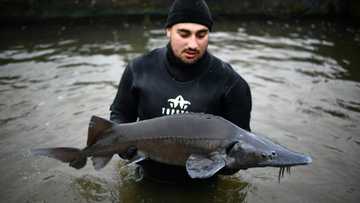Swiss to vote on foie gras, fur imports

Source: AFP
The Swiss will decide whether to ban foie gras and fur imports after campaigners on Thursday handed in enough signatures to trigger a public vote on the twin issues.
Outside the Federal Palace parliament buildings in the capital Bern, campaigners from the Swiss Animal Alliance, which launched the move, piled up boxes symbolising the certified signatures.
The popular initiative on foie gras collected 106,448 signatures, while the one on fur attracted 116,140 -- both above the 100,000 threshold required to trigger a national vote.
Foie gras is widely consumed around the December holiday season, giving extra resonance to the campaign.
Force-feeding ducks and geese -- a key way of making foie gras -- has been banned in Switzerland for more than 40 years, but importing produce derived from this method is not.
The popular initiative "Yes to the ban on importing foie gras" wants to change the constitution to ban the import of such products.
PAY ATTENTION: Click “See First” under the “Following” tab to see Legit.ng News on your Facebook News Feed!
The second proposal is entitled "Yes to the ban on importing fur products from mistreated animals".
With 200 tonnes of foie gras imported annually, "Switzerland unfortunately positions itself as one of the main importers of this product", says the Swiss Animal Alliance.
"Every year, 400,000 ducks and 12,000 geese are killed in order to meet the demand specifically in our country.
"It is hypocritical to ban Swiss breeders from producing foie gras under penalty of sanctions, while authorising the importation of this product."
As for fur, the Swiss Animal Alliance denounces "methods of breeding and killing (which) clearly contravene our legislation on the protection of animals and would be considered cruelty punishable by criminal sanctions in Switzerland".
It claims 350 tonnes of fur are imported each year, corresponding to the slaughter of around 1.5 million animals.
"More than half of these furs come from China, where the terrible conditions in which animals are detained and killed, some of which are skinned while still alive, are regularly denounced," it claims.
Packaging change
Almost all European countries prohibit the force-feeding of geese and ducks, with France, Hungary and Bulgaria notable exceptions.
In September, Switzerland's parliament rejected a bid to ban foie gras imports but ordered that the production methods had to be stated on the packaging.

Source: AFP
Switzerland has direct democracy, with citizens able to trigger popular votes.
They can propose new laws themselves in initiatives, and challenge decisions taken by parliament in referendums.
A total of 100,000 valid signatures within 18 months are required to trigger a national initiative. A change of law requires a double majority of voters and cantons.
Popular votes take place every three months.
PAY ATTENTION: Unlock the best of Legit.ng on Pinterest! Subscribe now and get your daily inspiration!
Source: AFP




